8 Grocery Items You Should Always Buy In Bulk, According to Experts
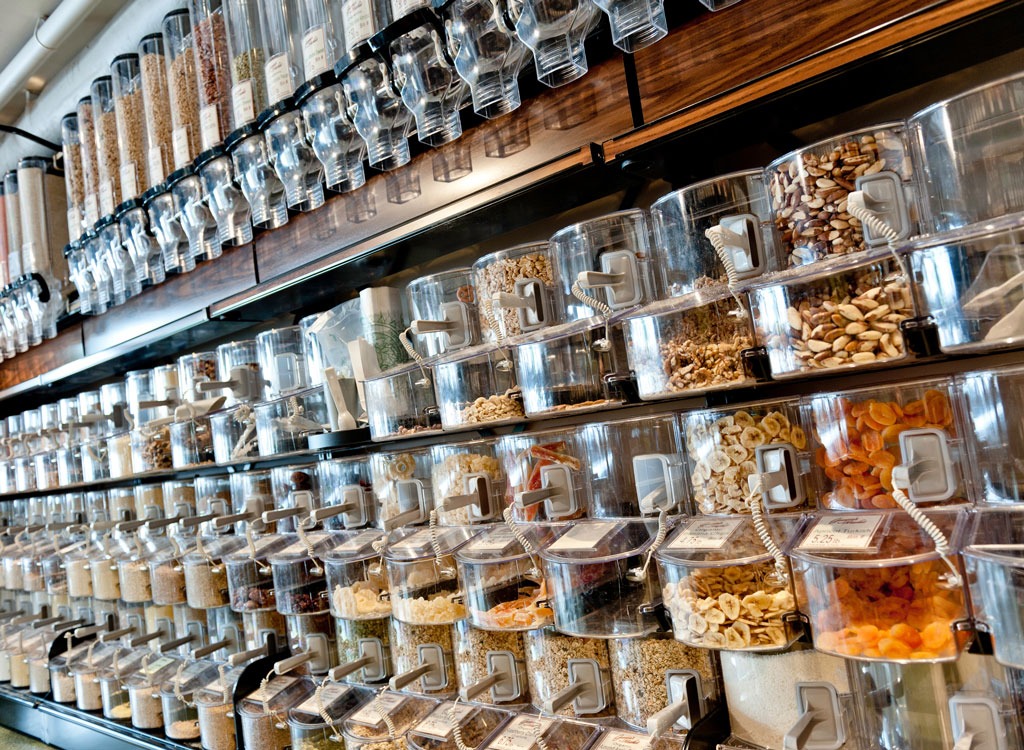
With grocery costs rising each year, it's tempting to take advantage of sales to stock up on all your favorite pantry staples before prices climb even higher. But we would advise having a solid game plan on what exactly is worth buying to stretch your dollar before you fill your shopping cart with years' worth of beans and canned goods.
First, it's important to know that some items are just simply not cut out for bulk buying. A few products at the top of this list are coffee, spices, condiments, and the absolute worst: fresh produce.
With so many things on the blacklist, you may be wondering if your Costco membership or Sam's Club membership is even worth it. But fear not. Purchasing in large volumes is still a perfectly viable option for you and your family if you're strategic and know what to buy.
To help steer your cart in the right direction, we have enlisted the help of a couple of trusted nutritionists. Read on to hear their expert opinions on the subject, and find out which grocery items are your safest bet to buy in bulk.
In This Article:
- Dried Beans and Lentils
- Protein Powder
- Frozen Poultry and Fish
- Chia Seeds
- Nuts
- Frozen Fruits and Vegetables
- String Cheese
- Frozen Veggie Muffins
Dried Beans and Lentils

The benefits of having a hefty supply of dried beans or lentils on hand are threefold, according to Lisa Moskovitz, RD, CEO of NY Nutrition Group and author of The Core 3 Healthy Eating Plan. First off, Moskovitz explains that dried foods such as these have a much longer shelf-life than other cooked or fresh food items. Beans and lentils are also extremely versatile and make great additions to a wide variety of dishes, including soups, salads, or stir fry. Mmmm, we're dreaming of a scrumptious pot of chili on a cold winter day, or even a refreshing Mediterranean bean salad.
Lastly, Moskovitz points out that these dried foods are an excellent source of plant protein and other essential nutrients. "Buying beans in bulk means you'll always have protein on hand—as well as a reliable source of fiber, iron, magnesium, and potassium—and ready-to-cook whenever you need it," she says.
Protein Powder

Gym buffs will be happy to know that protein powder is another nutritionist-approved bulk item. "If you're someone who uses protein powder, you know that it's easy to run low, and it can be a pain, and pricey, to replenish," says Moskovitz. "Protein powders are a great item to buy in bulk as they have a reasonable shelf life and can help supplement a healthy, balanced diet."
She does warn, however, that while protein powder is a quick way to get more muscle-preserving amino acids into your diet, it should not fully replace other proteins. Make sure you are still including foods like lean beef, fish, poultry, eggs, whole grains, and the aforementioned beans and lentils into your weekly meals to stay healthy and get those all-important gains!
Frozen Poultry and Fish
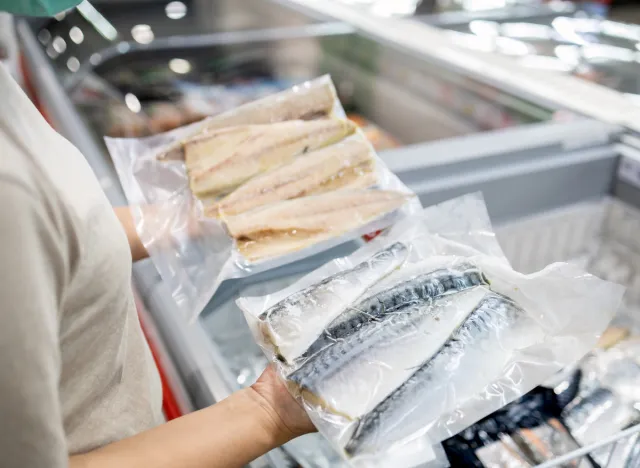
Speaking of protein options like fish and poultry, you can go ahead and add copious amounts of those items to your grocery list as well—but make sure they're the frozen varieties. Moskovitz says that while fresh fish and chicken are typically pricey and go bad quickly, "buying your protein frozen and in larger quantities can help you save money, prevent spoilage, and make it easier to reach your protein needs for the day."
Good news is that you are also able to safely throw both frozen chicken breasts and fish straight into the oven without thawing when you're in a pinch—but, it might take a little bit longer to cook all the way through. Still, it's a great fallback for when someone forgets to take the meat out of the freezer in time.
Chia Seeds
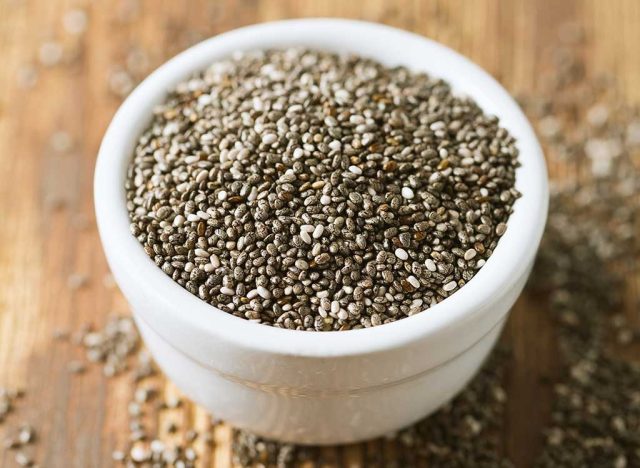
Chia seeds are small but mighty, packed full of nutrients such as omega-3, fiber, and protein. They are known to help improve blood sugar and cholesterol levels, support digestive health, and to promote a healthier heart. For these reasons, they have quickly become a popular add-on sprinkled into smoothies, yogurt, cereal, bread, muffins, and even water.
But one downside is that they can be costly. To combat this, Moskovitz suggests stocking up when you find the right price. You can breathe easy knowing they will stay shipshape for up to a year—and even longer if you throw them in an airtight container in the fridge!
Nuts
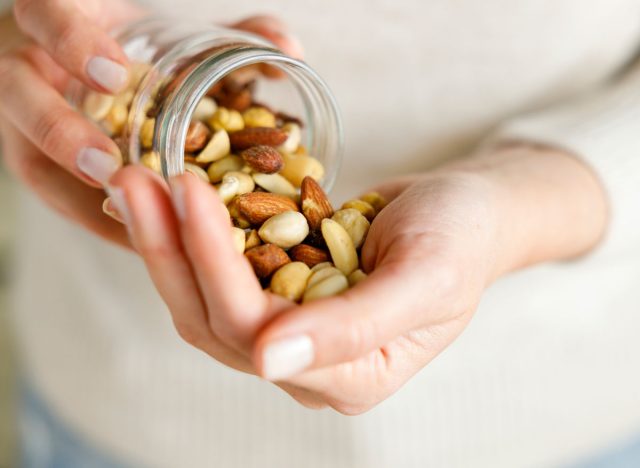
One thing you can go nuts with is nuts! Moskovitz shares that nuts such as almonds, pistachios, and walnuts, are her "top recommendation for a portable, non-perishable, and ultra-nutritious snack." But it can be difficult to keep nuts in stock on a regular basis so buying in bulk can be a clever way to "keep yourself prepared with a healthy, satisfying snack at all times."
Nutrition consultant and author of The Sports Nutrition Playbook Amy Goodson, MS, RD, CSSD, LD, couldn't agree more. "Full of nutrients, unsaturated heart-healthy fats, and plant-based protein, nuts are a snack that can keep you satisfied for hours. What's better is that when grocery shopping, you can purchase nuts in large, resealable bags or in individual, on-the-go serving-size bags. And the real win is that nuts have a long shelf life so you can stock up on them and be ready for your next snack attack."
Frozen Fruits and Vegetables
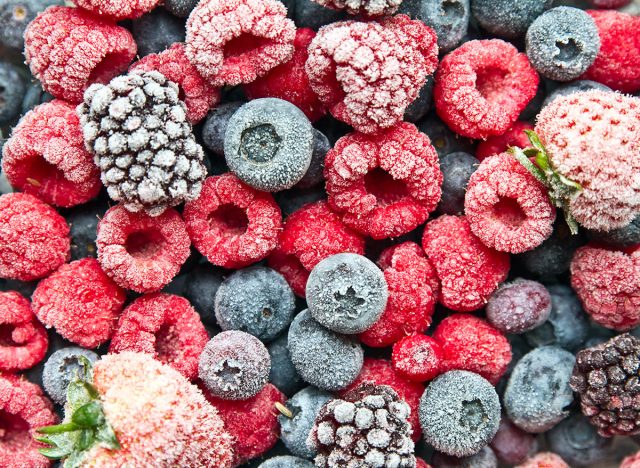
Wilted spinach, browning avocados, sprouting potatoes—this is the sad reality many people face when they make the ill-advised decision to purchase fresh produce in bulk. If you really enjoy having these items constantly in abundance around the house, though, frozen varieties could be your lifeline. Goodson tells us why. "Frozen fruits and vegetables are frozen at their peak ripeness to lock in all the nutrients," she shares. "Stocking your freezer with frozen produce is an easy way to include fruits and veggies as a part of your family's meal routine."
And that's not all. Goodson's favorite thing about frozen produce is that you can store it safely in your freezer for up to six months—compare that to a shelf life of just a week or so for fresh fruits and veggies kept in the fridge or just mere days for those kept at room temperature. Save yourself from the embarrassing waste of both food and money and just opt for frozen.
String Cheese
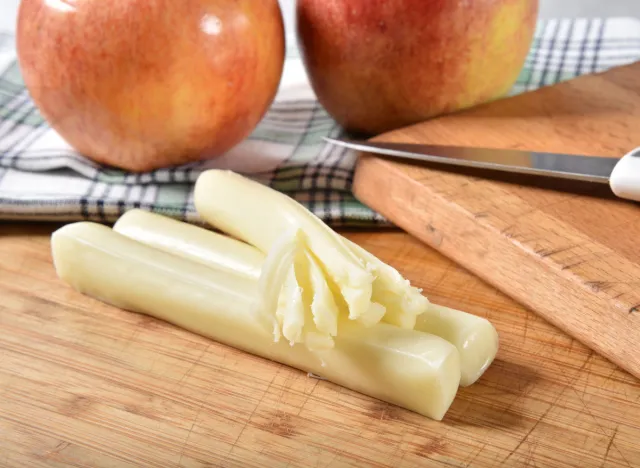
String cheese is a snack everyone can enjoy (there's something so deeply satisfying about pulling it apart), and it's also one of the few refrigerated items that our experts have given the green light to purchase in large quantities. According to Goodson, the way that string cheese is individually packaged—unlike shredded cheese or other forms—allows it to stay fresh for up to six to eight weeks. This makes it a great item to have handy and one that additionally provides some great health benefits.
"String cheese is a fantastic, portable protein for kids and adults, plus it provides calcium and other essential nutrients," says Goodson. "It can be eaten as a part of a snack and is an easy protein addition to lunch boxes for the whole family."
Frozen Veggie Muffins
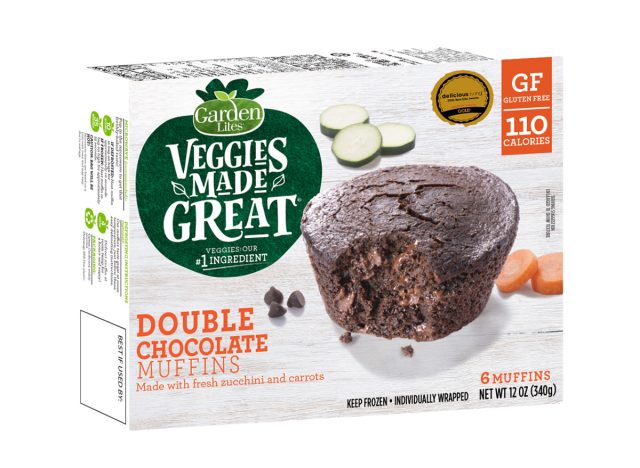
In Goodson's freezer, you'll also find a stockpile of Veggies Made Great Muffins—she swears by these little treats. Each is individually packaged, nutrient-dense, and ready to eat after a quick spin in the microwave. But, the best part? The number one ingredient in each is a vegetable like zucchini or carrots.
"They have lots of flavors to satisfy your sweet tooth, like Blueberry Oat, Double Chocolate, Cinnamon Roll, and more!" Goodson adds. "Each muffin is 90-120 calories, contains fiber and gluten, and is nut-free (helpful for families with food allergies in the house). As a dietitian, they are one of my favorite sweet treats!" We think these are definitely worth a try, and some flavors are even available in packs of 20 at Costco!
Why Trust Eat This, Not That!?
Eat This, Not That! is committed to creating high-quality content that you can trust to be accurate, properly researched, routinely reviewed, and updated with the latest information. Our writers, editors, and medical and/or certified experts consider this to be an unwavering promise we make to our readers in the pursuit of delivering impactful and meaningful content.









